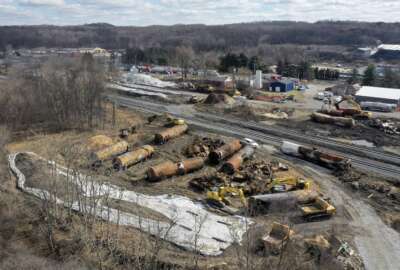
East Palestine shows need for community resilience
Community resilience programs exist in several agencies. An incident shows how important they are.
You’ve likely never been to East Palestine, Ohio, the small village torn asunder by a railroad crash.
Neither have I. But in a sense we’ve been there a hundred times. Anyone who has chosen the nation’s wonderful back roads to travel long distance has driven through small towns. Often these towns present as picturesque and proud. Yet often they are quite fragile economically. As a result, they lack the native resilience necessary to mitigate disasters. If any good can come this latest non-natural disaster, that would be a revitalization of federal community resiliency programs.

Small burgs and hamlets appeal even to city slickers. I recall once, during a solo trip, stopping my motorcycle for a coffee break in Leechburg, Pennsylvania — population 2,149. It’s not far from East Palestine. Two friendly townies sitting out front of the Coco Coffeehouse kept me talking there for nearly an hour. They pulled a low stool out of the shop for me to sit on, while the proprietor brewed a fresh pot of coffee. Leechburg is surrounded by a U-shaped river bend, with a railroad track along the river. Anything could happen.
The horror show in East Palestine produced a litany of purported villains. Railroads, the other political party and its policies, the chemical industry. Most of the charges and countercharges are inaccurate, in some cases deliberately so. Yet loss and distress of the East Palestine residents is real enough. Just imagine no longer trusting your well water or the air you breathe, and feeling that the value of your home gone up with the cloud of burning vinyl chloride.
People naturally look to the federal government for help. Especially when problems overwhelm local and state resources. All it took in this case, according to the preliminary report from the National Transportation Safety Board, was for a rail car wheel bearing to seize from overheating. A device the size of a Diet Coke can that a rail maintenance person can change out in about 10 minutes.
The federal government is the provider of last resort in disasters of any sort, financially and technically. But capability exists at the state and local levels, too. So the question isn’t whether Transportation Secretary Pete Buttigieg or President Joe Biden should go there. Or Donald Trump. That’s cable TV fodder. Moral support lasts the length of the photo op. What people really want is potable water and clean air. The question is, rather, what can the federal government do to continuously build in capacity and resilience at the state and local levels, so that a federal response need be invoked less frequently?
Many federal officials who can actually help have been or remain in East Palestine. They arrived from the Environmental Protection Agency, the Centers for Disease Control and Prevention and several components of the Transportation Department. The question remains, though, does sufficient resilience exist for small towns and villages such that the provider of last resort doesn’t have to be the first responder, or even the principal responder?
Community resiliency has long been a concern for the federal government. “Community resilience, the ability to withstand the impacts of natural, technological, or human-caused hazards and recover community functions quickly, is a local and a national issue,” states the National Institute of Standards and Technology on its community resilience program site.
Resiliency of fragile communities overseas occupies much of the mission space of the U. S. Agency for International Development. This helps in diplomatic, humanitarian, and national security domains. Disasters in the U.S. show the need for a focus on community resilience.
Copyright © 2024 Federal News Network. All rights reserved. This website is not intended for users located within the European Economic Area.
Tom Temin is host of the Federal Drive and has been providing insight on federal technology and management issues for more than 30 years.
Follow @tteminWFED




